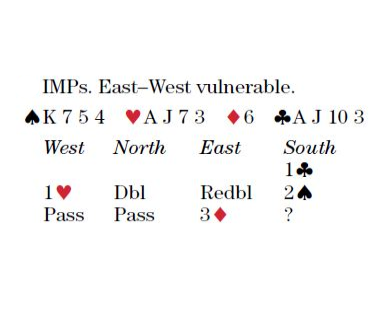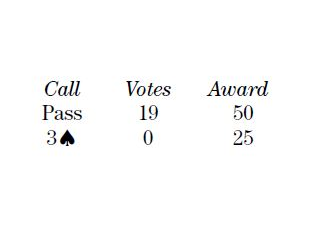
What’s your call?
| 3♥ | 3♠ | 3NT | ||
| 4♣ | 4♦ | 4♥ | 4♠ | 4NT |
| 5♣ | 5♦ | 5♥ | 5♠ | 5NT |
| 6♣ | 6♦ | 6♥ | 6♠ | 6NT |
| 7♣ | 7♦ | 7♥ | 7♠ | 7NT |
| Dbl | Pass |
Leave it up to partner
While there are three who think the free 2♠ was a bit of an overbid, the panel passes in harmony at their next opportunity.
Boehm is one who disagrees with the 2♠ call. “If East had passed, 2♠ is fine to confirm four. As it is, any spade bid should show four and 1♠ is enough. I may have trouble ruffing out my hearts without an overruff.”
“It’s close,” say the Coopers, “but we cast our somewhat divided vote for ‘disagree.’” As for part two, “We have already shown the hand we wish we held instead of the one we do, and that’s enough for us.”
Weinstein also calls it close, but gives the nod to 2♠. “This is a minimum 2♠ bid, especially since 1♠
would show four (we could pass the redouble without four spades).” He continues to part two: “Pass is a standout. We’re happy with anything partner does.”
“I am tempted to bid on,” says Cohen, “but partner might have four — even five — diamonds. Likely, 3♠ (if the defense leads trump) has no chance, so I don’t want to lock in a minus score.”
Rigal bids 2♠ “showing four spades, prepared to accept at least one game invitation.” He says it looks easy to bid 3♠ now, expecting to violate the Law, but hoping partner has clubs; “but partner can look at his own hand and decide his clubs are the equivalent of trumps.”
Stack agrees. “There is no compelling reason to do anything in front of partner. We have described our hand and partner still has a bid. If partner doubles or bids 3♠, then we are comfortable with that decision.”
The Joyces also leave it up to partner. “We have no appreciable extras here, and partner will be in a better position to make a decision, knowing how many trumps we have and whether he has a diamond stack.”
Sanborn approves of 2♠: “Short on high cards but with compensating distribution. Given my previous jump, partner has a right to expect the hand I have.”
Hampson approves the 2♠ call because “it removes any pressure to act again on my own.”
2♠ says it all, according to Walker. “I’m not going to bid the same values twice.”
Guests Isfeld and Henneberger don’t think 2♠ is a strength-showing bid. “We could bid 3♠ or 4♠ with strength.” They pass when the bidding comes back around.
Robinson explains his approach: “I think 2♠ should show four spades and 11–14 points, while 1♠ would show only three spades. After 1♣–1♦–Double–Pass, two of either major shows four while one of either major shows three.” Nevertheless, he passes at his next bidding opportunity.
“While the negative double shows four spades, it doesn’t promise four spades. I’ve made negative doubles with only three spades. I’ve shown four spades with extra values. Let partner make the last mistake.”
Lawrence agrees with Robinson that 1♠ would not promise four, and calls the hand “a mild misfit for spades. If partner has good spades and clubs, he will know that and will bid 3♠ if he has the hand for it. If he doubles 3♦,/span>, that is okay. I hope, actually, to get a chance at doubling 3♥.”

